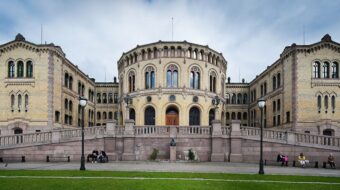The most destructive hurricane in 50 years hit western Cuba Aug. 30 with gusts up to 212 mph — the strongest ever recorded during any hurricane anywhere, according to head meteorologist Jose Rubiera.
Gustav’s destruction was terrible: 20,000 homes on the Isle of Youth, 90,000 in Pinar del Rio, the entire electrical infrastructure in western Cuba, crops on 32,000 acres, and 3,306 tobacco houses. The storm had already killed over 80 people in Haiti — where 15,000 houses were destroyed — and dozens elsewhere in the Caribbean. With its intensity reduced by half, Gustav went on to kill 18 people in Louisiana.
No Cubans died. The Mexican Daily Jornada described “well-oiled civil defense, a political-military system experienced in massive evacuations.” This time, 467,000 citizens — 4.5 percent of the Cuban population — moved into public buildings and homes of friends and families.
Planes from Russia and Spain arrived with humanitarian assistance. Tiny East Timor donated $500,000. The U.S. government offered $100,000 and promised more — only to non-governmental organizations — pending assessment in Cuba by U.S. experts. Cuba’s Foreign Ministry suggested instead that Washington drop its blockade, the cause of far greater losses than those from Hurricane Gustav.
In conjunction with Democratic congressional candidates running in Florida against the rightwing Diaz-Balart brothers and Ileana Ros-Lehtinen, Democratic presidential candidate Barack Obama proposed that restrictions on travel and financial assistance the Bush administration imposed on Cuban émigré families be suspended for 90 days.
How is Cuba able to prevent hurricane deaths? Mutual support, or solidarity, is one aspect, something much in evidence in Pinar del Rio if stories on Cubacoraje.blogspot.com are any indication. For example:
• “It is not his home that Roberto Amador is working on, but that of a neighbor. ‘Mine had less damage, only ten roofing sheets. First one must help those most needy; this woman has four small children.’”
• “Three men find some material to build a room. The temporary shelter will be for Tomasa Barbosa, an old woman who was left without a roof over her head and she doesn’t have family.”
• “The brigade of 52 linemen from Camaguey, who had worked until 3:00 a.m., resumed their work at 6:30 a.m. and in very high spirits; they are expecting another group of some 60 men who will be coming from Holguin [at the other end of the island].”
• “The conditions of the hospital are subhuman. Everybody is working intensively (patients, relatives and medical personnel). The 32 patients requiring hemodialysis — each accompanied by a relative and nurses — arrived in the capital yesterday at approximately 4:00 p.m. They had spent 48 hours without treatment but they were still doing well.”
• “In Vinales they began to distribute coal to families so they could cook. From one house came food for neighbors. Coffee was shared. Some houses have been converted into storehouses for their neighbors.”
Surely, however, reaching out to neighbors and to strangers is hardly unique to Cuba. Perhaps Cuba’s history contributes to its success in dealing with hurricanes.
Reporting Sept. 1 from Pinar del Rio, Jorge Gonzalez observed, “It looked like recuperation would be impossible and those thousands and thousands of victims this time would have to wait for a heavenly miracle to help them ease their hunger and thirst and retrieve a bit of their scattered or destroyed belongings. I know it’s not like that since the miracle in Cuba is permanent.”
“From 1959 on,” Gonzalez said, “a process of social change began developing here in which the human being has been the protagonist for excellence. Everybody knows that for those who have lost everything and whose electricity has been out for just a few hours, help will arrive without fail, their houses will go back up and the roofs reappear, not through magic but because the country offers them moral and material support. Give or take a few days, solidarity brigades from every province will fix the roads and electrical wires and life will return to normal.
“They know the top state leaders don’t hide in some underground bunker or take an airplane keeping them at a distance from the tragedy. No, they will be there where things happened, encouraging the neediest and carrying a message of hope and certainty that no one will be forgotten. Almost half a million of our citizens were moved to safety in sufficient time, some in schools, others in secure houses of family, friends, or neighbors with whom they’ve perhaps never exchanged even a greeting, sharing there the little bit of food and available blankets, but with confidence that their lives are out of danger.
“Nothing has been left to chance since years of accumulated work by Civil Defense exists in the background as sufficient guarantee that all the gears would function like a high precision watch … Only one word comes to my mind now to put this all together and to express appreciation to anyone involved in preparations so that we might live: Revolution!”
On Aug. 29, as Gustav threatened, former President Fidel Castro observed, “We are lucky to have a Revolution! It is a fact that nobody will be neglected. Our strong, forceful and farsighted Civil Defense protects our people.” He added, “The growing frequency and intensity of these natural phenomena show that the climate is changing due to the actions of human beings.”
Castro said he had heard from a resident of the Isle of Youth:
“I can’t find the words to relate to you what I saw yesterday … In my 38 years of life I had never seen anything like it and the people I talked to in my territory had never seen anything worse; it’s incredible how their morale is so high … many have lost their homes and most have seen their belongings, beds, mattresses, TV sets, refrigerators, etc. ruined. Most of the population is in this situation.”
Castro’s informant continued: “At the moment, human solidarity is the most important thing. The people’s morale is high but that will not last forever; it will be necessary to solve some things in the next few days. As the energy services are reestablished, it will be necessary to set up information centers where the people can gather to know what’s going on in the country and the municipality, or even to listen to music or spend some time together.”












Comments